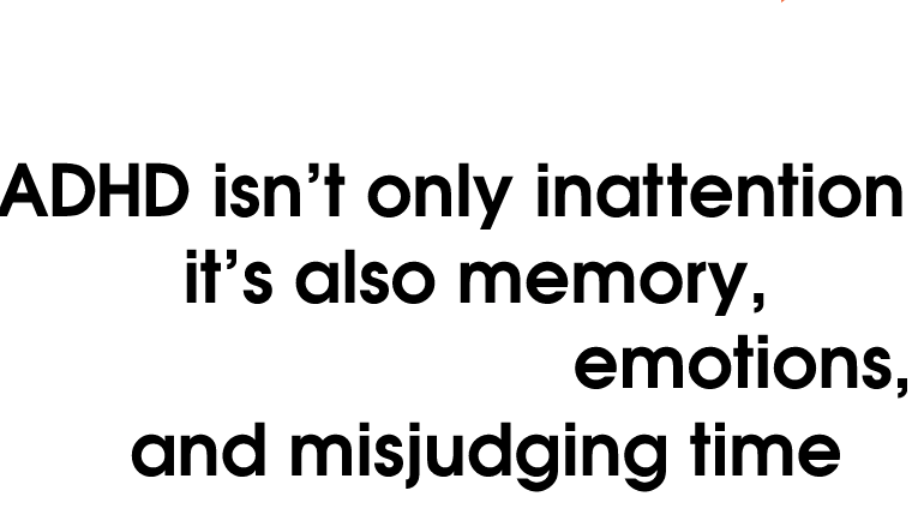
ADHD: More Than Just Inattention
It's a fairly common misconception that ADHD is mostly about not being able to focus. The reality is far more complex and multifaceted.
ADHD affects multiple aspects of a person's life, including memory, emotional regulation, and time perception. These less-discussed symptoms can have a profound impact on daily functioning and quality of life.
By recognizing these less-obvious symptoms, we can develop more comprehensive strategies for managing ADHD and supporting those who have it. Whether it's using memory aids, practicing emotional regulation techniques, or implementing time management tools, understanding the full scope of ADHD is the first step toward effective management.
The Memory Struggle
People with ADHD often grapple with working memory challenges. Working memory is the brain's ability to hold and manipulate information in the short term.
This can make it difficult to:
For example, someone with ADHD might struggle to remember a shopping list, even if they've just looked at it. They might start a task, get distracted, and completely forget to finish it.
(We'll explore strategies for managing these memory challenges in our upcoming article "Find a Coach to Help You Live Well," which will discuss organizational techniques and tools for ADHD.)
Writing things down or asking for information to be provided in text format can be really helpful.
If you have online meetings, try turning on captions (and transcriptions) - even if you don't have ADHD this can be incredibly positive for others.
Emotional Rollercoaster
Emotional dysregulation is a significant but lesser-known aspect of ADHD. It's not just about being "moody" – it's about experiencing emotions more intensely and having difficulty managing them.
Individuals with ADHD may experience:
For example, a minor setback like spilling coffee might trigger an intense wave of anger or despair. A small compliment could lead to excessive excitement or elation.
This emotional intensity can strain relationships and lead to feelings of shame or inadequacy. It's crucial to understand that this isn't a character flaw, but a genuine symptom of ADHD.
(We'll delve deeper into emotional regulation strategies in "Manage Your Stress: ADHD Edition," and explore relationship dynamics in "Address Common ADHD Relationship Challenges.")
Even though I'm covering this in a later post I can't help myself but to put this here today:
Managing emotional dysregulation is a skill that can be developed over time. Be patient with yourself as you learn and practice these techniques.
You aren't broken, just different.
Time Blindness
Misjudging time is often not thought of as an ADHD complication but it's actually a hallmark feature! This phenomenon, often called "time blindness," can have far-reaching effects on daily life.
It can lead to:
领英推荐
For instance, someone with ADHD might consistently believe they can get ready for work in 15 minutes, even though it always takes them 45. This isn't deliberate – their brain simply struggles to accurately perceive and estimate time.
(Look out for our future article "Find Appropriate Accommodations at Work" for time management techniques specifically tailored for ADHD brains.)
Quick Tip: 10 minutes is AGES, but 600 seconds is not (at least to my brain). Try and find a way for you that helps you judge time better.
The Overwhelming Nature of ADHD Symptoms
It's essential to understand that these symptoms aren't just inconveniences – they can be profoundly overwhelming and demoralizing.
Many individuals with ADHD struggle with intense negative self-talk and feelings of inadequacy.
As an intelligent person, how can I not remember a simple fucking list of three things?!
This frustration is something I feel regularly and whilst entirely valid is still pretty painful. It's the voice of someone who knows they're capable, yet consistently struggles with tasks others seem to manage effortlessly.
This internal conflict can lead to:
The disconnect between knowing you're intelligent and still struggling with seemingly simple tasks can be maddening. It's crucial to remember that these difficulties aren't a reflection of intelligence or worth – they're symptoms of a neurodevelopmental disorder.
(We'll address self-esteem and positive self-talk strategies in a future post on mental health and ADHD.)
A Personal Journey: Diagnosed at 43
For years, I struggled with what I thought were just personal quirks. I’d forget important information, struggle to complete tasks on time, and often feel overwhelmed by my emotions.
It wasn’t until I was 43 that a friend suggested I might have ADHD. At first, I laughed it off. “Isn’t that something kids have?” I thought. But as I researched, so many pieces of my life started to fall into place.
The diagnosis was a revelation. Suddenly, I understood why I’d always felt different. It wasn’t laziness or lack of effort – my brain simply works differently. Now, with proper treatment and strategies, I’m learning to harness my ADHD traits as strengths rather than seeing them as weaknesses.
If you’re an adult struggling with similar issues, don’t hesitate to seek help. It’s never too late to get answers and improve your quality of life.
(We'll explore the process of adult ADHD diagnosis and treatment options in future articles.)
Understanding the Full Scope of ADHD
Understanding these various facets of ADHD is crucial for effective management and support. It's not just about paying attention – it's about navigating a world that often feels out of sync with how your brain operates.
By recognizing these less-obvious symptoms, we can develop more comprehensive strategies for managing ADHD and supporting those who have it. Whether it's using memory aids, practicing emotional regulation techniques, or implementing time management tools, understanding the full scope of ADHD is the first step toward effective management.
Stay tuned for tomorrow's post, where we'll explore self-care strategies that can make a real difference for those living with ADHD.
This ????????
Lead Data Engineer at Uinsure
1 个月The time thing is something only a fellow ADHDer understands. It makes no sense to anyone else